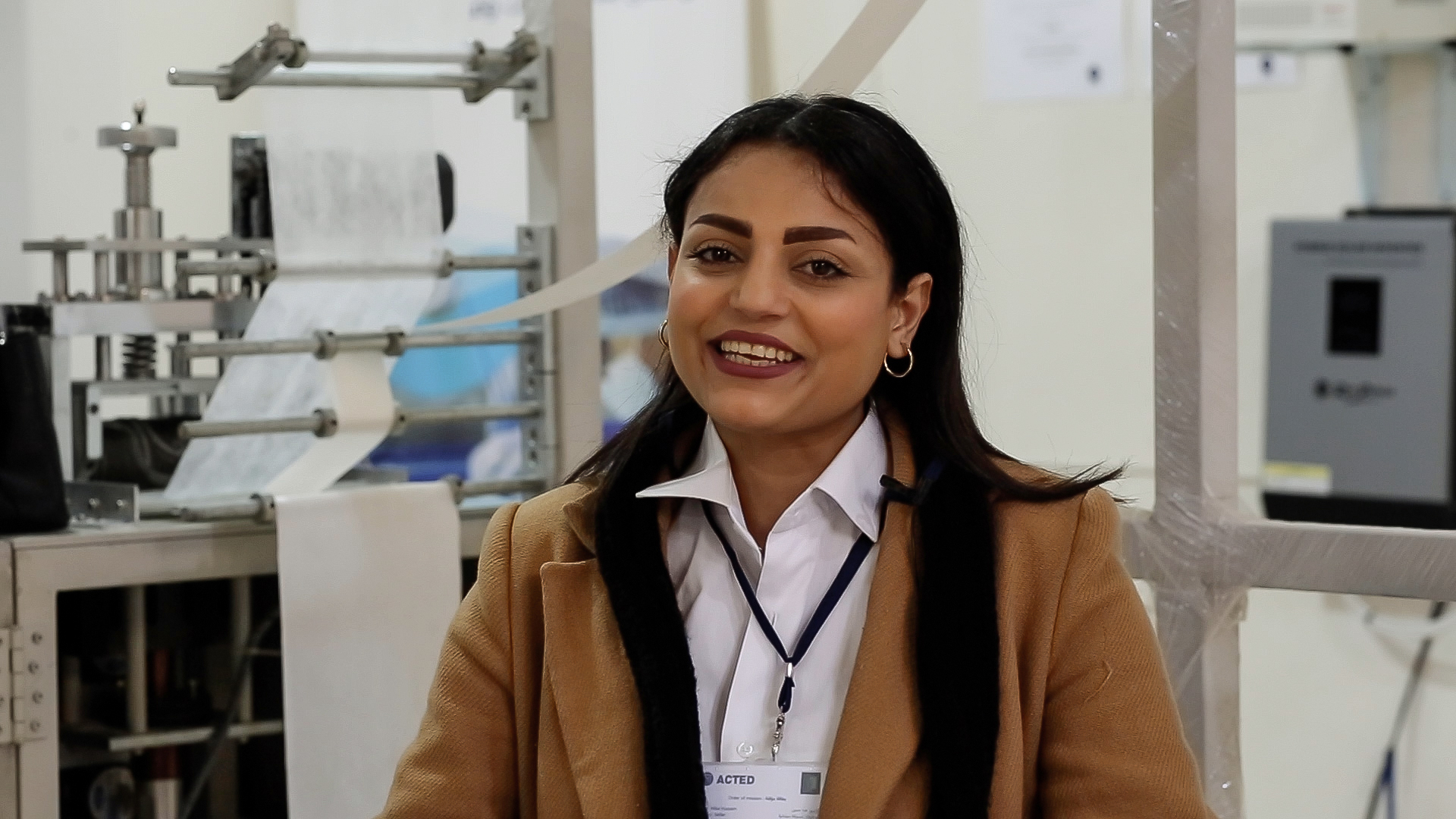From where I stand: “It’s about time for young girls to speak up about reproductive health”
Date:
Hiba Mohammad Hussein, 34 years old, is a mother of two from Tripoli, north Lebanon. In 2015, she took over as the family provider when her husband was hurt in clashes. She had been working to make ends meet as a driving instructor, but with the increasing price of fuel, this had become difficult. In 2021, she began working with a joint social enterprise led in partnership with the Lebanese NGO, Roof and Roots Association, UN Women and ACTED, making sanitary products and raising awareness on reproductive health.

![]()
I have been driving for 16 years and a few years ago began teaching women and girls to drive for a small fee. I did this because my husband was injured during clashes here in Tripoli, in May 2015, and I needed to take over as the primary financial provider for the family. Over the last three years I have taught over 800 women and girls to drive. However, over the last year this work was becoming more difficult because of the high and increasing gas prices and the recurrent shortages.
People in Tripoli face many financial difficulties, poverty, and unemployment because the city has always been under served and supported. However, luckily many non-governmental organizations have stepped in and supported us professionally, financially, economically, and even psychologically. We rely heavily on them for support.
One of the issues affecting my community is period poverty. The increasing prices of menstrual hygienic products have seriously affected us as women and affected me personally and my daughter. I have tried reusable cloth menstrual products, but my daughter did not feel comfortable using them. There was a time, last summer, when menstrual hygienic products where not even available in grocery stores.
Last year I read on social media about the social enterprise Roof and Roots in Jabal Mohsen, Tripoli, and their work to set up a unit producing sanitary products. I have applied to help their work and joined a group of women and girls who received vocational training and short-term employment opportunities. I was hired to work specifically on marketing the sanitary pads produced, which is interesting to me since I studied marketing but have never had a marketing job.
I began my work with them by receiving trainings on issues related to menstrual hygiene and gender awareness, labor law and employability skills. As part of the sellers’ group, I also received sales and marketing trainings. When the training ended, I began to visit families in their homes where I hosted discussions - attended by all present women and girls, under the age of 55- on period poverty and menstrual hygiene. After each session, I promoted our sanitary product, called “Rose”, and began selling it door-to door. During the visits, I met a mother of four girls who barely had money to make ends meet. Buying sanitary pads were no longer a priority for her and she was not even able to purchase our affordable pads. I paid myself for these items and I am still trying to support her, in any way possible.
This work has taught me patience as I knock on doors to try and convince busy or uninterested women to make the time for these discussions and awareness sessions. It has also allowed me to be more self-sufficient and help my family.
Unfortunately, in many parts of the country we are still bound by norms and harmful traditions that perpetuate inaccurate information about menstruation. Thanks to this work, we have been able to provide health awareness sessions to women across generations, to adult women and to young girls who are beginning to speak up and correct misconceptions about menstruation. This is important. We need to create safe spaces for adolescent girls to discuss their reproductive health with experts, to allow them to properly discover their bodies and understand the physical and hormonal changes they experience. It is about time for girls to stop being scared whenever they get their periods, and for them to understand how to deal with it.
Hiba is one of 120 women enrolled in a project supported by the Government of Japan, in Jabal Mohsen, through the Lebanese NGO, Roof and Roots Association, UN Women and ACTED, an international NGO. As part of the project, participants received a set of trainings, including on menstrual hygiene and gender awareness, code of conduct, the Labor Law, sexual exploitation and abuse, health and safety, and a range of upskilling employability skills. The project supports a Lebanese social enterprise to establish a new production line, producing quality affordable sanitary items. In doing this, it seeks to support Lebanon’s productive sectors while creating sustainable employment opportunities for women. It also aims to address period poverty through the sale and distribution of affordable sanitary products, and community awareness raising on menstrual hygiene.
Hiba’s story illustrates the importance of achieving Sustainable Development Goal (SDG) 5 on gender equality and the empowerment of women; and SDG 10, which calls for reducing inequalities in income as well as those based on age, sex, disability, race, ethnicity, origin, religion or economic or other status.